Part 2: First Blood to the Jizrunids
Chapter 2 - First Blood to the Jizrunids - 1072 to 1086Late in the year 1073, one of the greatest conquerors in history died, and not under usual circumstances. Despite leading the Turks in countless victories and seizing large stretches of land from Baluchistan to Mesopotamia, Alp Arslan’s decisive defeat in the battle of Manzikert at the hand of the Byzantine Empire had struck him a blow from which he would never recover, his mental state gradually declining until he could take it no more.
When the Sultan’s body was discovered, his eldest son and heir Malik was quickly crowned as his successor, and the young man has already vowed to avenge his father’s death by defeating the Basileus in open combat.
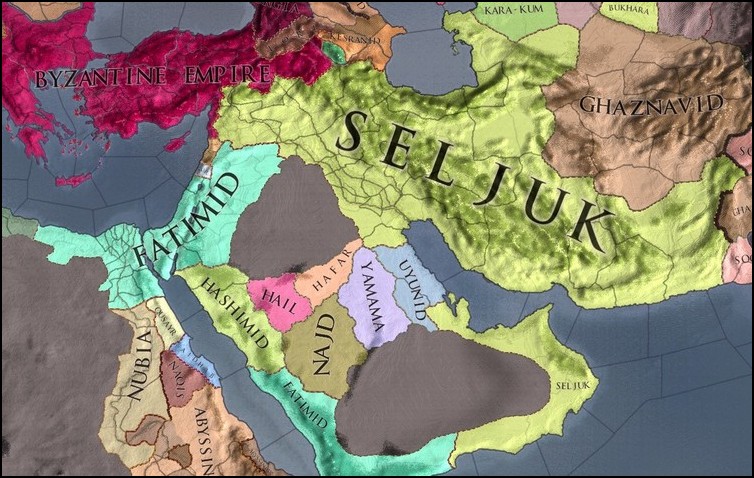
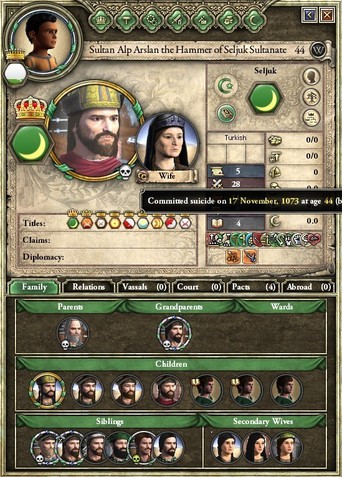
As two great empires struggle for dominance in an ancient land, a small and lacking sheikhdom on the other side of the world is still reeling from the second death of a ruler in less than a decade.
Sheikh Muhammad, however, would not be sorely missed. In fact, the Shura or Council had already been dealing with the politics of the realm long before Muhammad’s death - enforcing law codes, imposing tithes, delivering justice - so the only real change was that they became the Regency Council rather than the Sheikh’s Council.
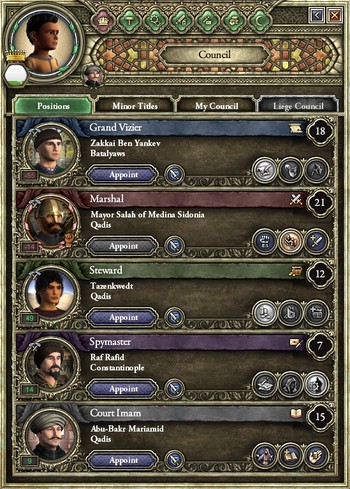
The matter of who would became Regent to the young Az’ar, on the other hand, was hotly contested. One of the local Wali, city governors, quickly took Az'ar into confinement and proclaimed himself regent. He would die under mysterious circumstances within two weeks, however, quickly followed by a council of imams seizing power instead. The authority of these imams would be just as short-lived, however, as in the end, Azar’s cunning mother was able to wrench the reigns of power in her own favour, convincing her young son to name her as his sole protector.

The fact that she was a woman made it very difficult for her to actually cement her position, and she was eventually reduced to bribing off her greedy enemies and threatening the jealous ones.
Once she was officially confirmed as Regent, however, she proved herself worthy of the station. She actively participated in the day-to-day running of Cádiz, allocating vast sums of money to ambitious construction projects and the expansion of the army, something Sheikh Muhammad would never have done. Under the early days of her regency, local marketplaces were expanded, training grounds sprouted up, and the Sheikh's Palace was torn down, rebuilt and refurbished.
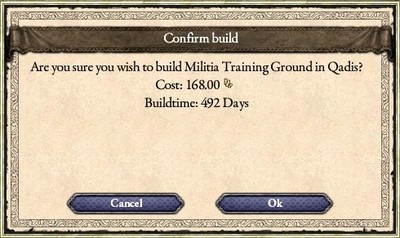

Meanwhile, even greater struggles for power were ongoing in the north. The successor of Emir Abu Bakr, Yahya, was just as ruthless and unforgiving as his father, and he was able to deal the Kingdom of León a fatal blow in the constant conflict between Muslim and Christian. King Alfonso of León was forced to escape his palaces under cover of darkness, slipping past Yahya's siege and fleeing to his last loyal strongholds, in the northern mountains.
With the gold and prestige he’d earned in the war, Emir Yahya decided to proclaim himself Sultan, a threatening and presumptuous move to many on the peninsula.
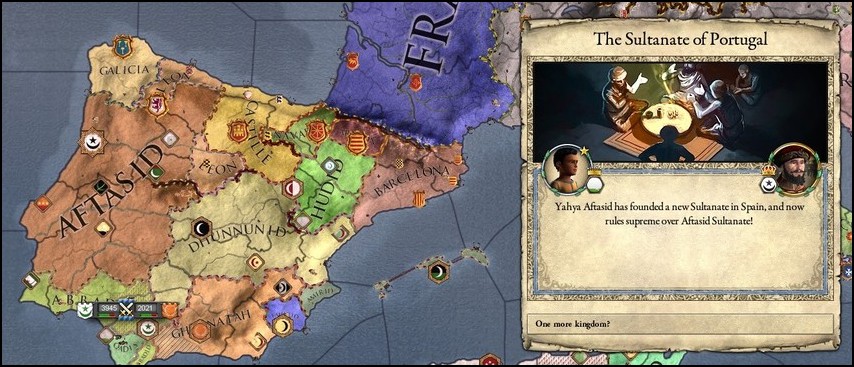
Back in Cádiz, the Sheikh’s Council was worried that Aftasid ambitions would know no bounds, and that
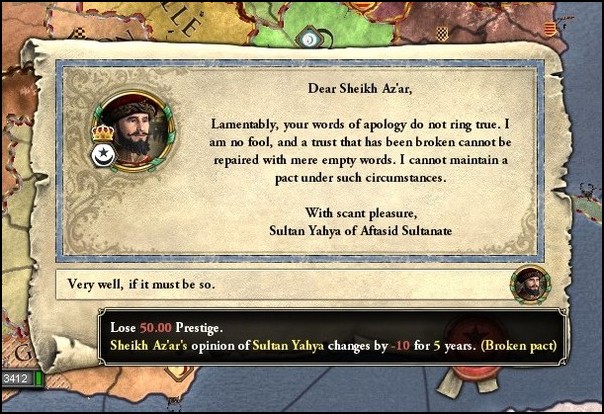
Understanding the danger that the Sheikhdom was currently in, the regency council eventually decided to contribute some funds to the fortification of Cádiz, and with the help of builders and engineers recruited from surrounding cities, the crumbling walls encircling the city by land were gradually renovated.
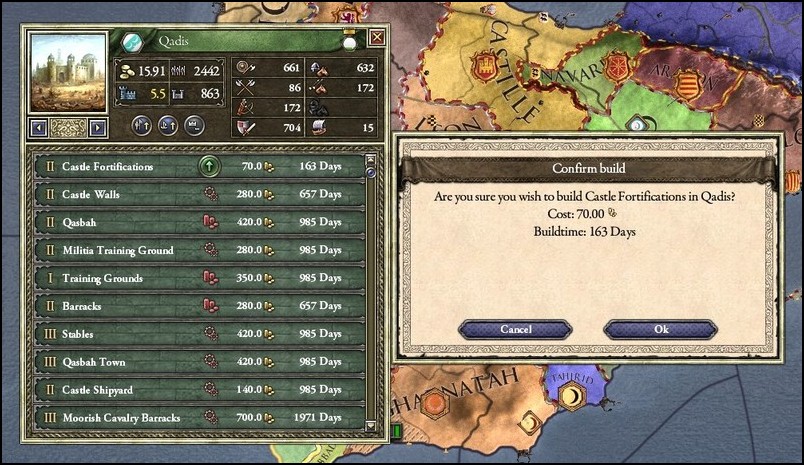
As for the young sheikh himself, he was allowed to run wild throughout his youth, with his mother and councillors far too busy with affairs of state to actually make sure he was attending every lesson. So Az’ar was often able to escape his tutors, instead playing with the other children in the countryside, riding horses or getting into scuffles.

Some of these scuffles escalated into actual fistfights, and Az’ar would become famous for his short temper and heavy fist, blackening many an eye in his time.


Az’ar actually got into a particularly vicious fight with the son of a wazir, at the age of about 12, and left the boy unconscious. He was punished for this by his mother, of course, but the fight was also witnessed by the Marshal of Cádiz, Salah. Impressed by Azar’s fierceness, he offered to take the young prince under his wing.
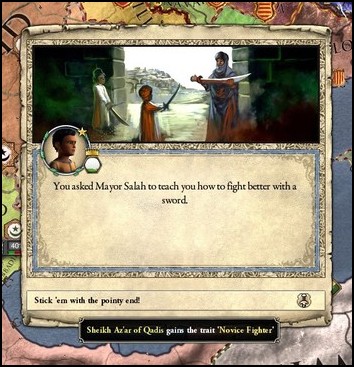
After a short period of consideration, Azar’s mother agreed, and the next few years were made up chiefly of the young Sheikh swinging blades and riding horses. He quickly proved to have a remarkable affinity for battle strategy, to the point of obsession, and would devour any book about the exploits of past conquerors that he could get his hands on.
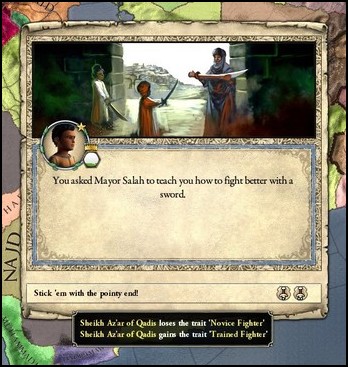
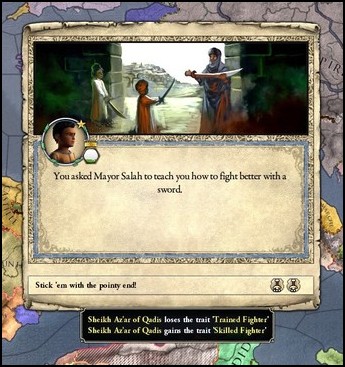
Not all of his youth was made up of ditching classes or fighting other children, however. There were also a few… darker stories, hushed rumours, and reluctant whispers that spread about the young sheikh. Azar’s childhood had been littered with scandal, not least of which included the deaths of his wetnurses, but as he aged into a young man, it seemed as though he was nothing but an average boy.
In actuality, nothing could be further from the truth. Darkness still clung to Az’ar like a cloud, he had just gotten better at hiding his malicious thoughts and intentions. He would torture live animals and play cruel, often violent, tricks on the other children, all without anyone ever discovering or blaming him. Only his mother caught him in the midst of such acts, but in her fright, she turned a blind eye.

Thus, by the time Az’ar reached his majority and was confirmed as Sheikh, the lords of Cádiz were presented with a very unusual liege, of the like they’d never experienced before.
Despite being rather lean in physique, Az’ar had a reputation for being very skilled with a blade, and he was eager to have his first taste of actual combat. The new Sheikh, however, was also very cunning, as anyone who kept lifelong secrets had to be. He had never excelled in his studies, but he still showed a degree of natural skill in many areas of rulership, earning him the support of many of his vassal imams, walis and wazirs.
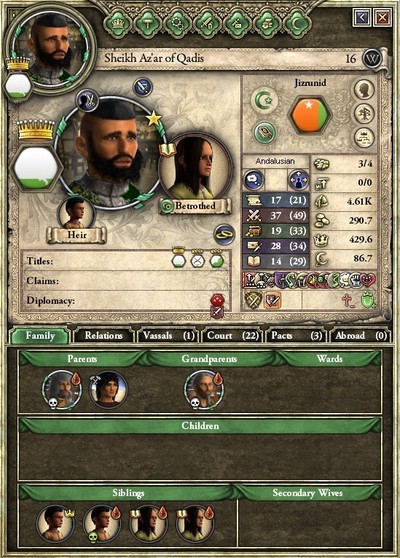
Azar’s now-defunct Regency Council immediately advised their liege to embark on the Hajj, as was customary for sheikhs upon reaching adulthood, it would undoubtedly earn him the loyalty of the clergy. Az'ar, however, scoffed at these suggestions, he was not interested in the long and uncomfortable journey to Mecca.
No, his eyes were set much closer to home.

Within a few weeks of becoming Sheikh, Az’ar commanded his vassals to prepare for a war, informing them that he would be marching into the Abbadid Taifa under arms before the month was out.
This, obviously, was met with anger and shock. The Abbadid Emirate was a regional power in its own right, and would usually be able to field a far larger army then Cádiz, so Azar’s vassals were right to be surprised. The young Sheikh, however, had been closely observing the events playing out just beyond his border for some weeks now, where the Abbadid Emirate was embroiled in a disastrous war against the Emirate of Gharnatah.
Believing this to the best opportunity he would ever get to expand, Az’ar once again commanded his vassals to raise their levies, or else face the cold, dark dungeons of the oubliette.
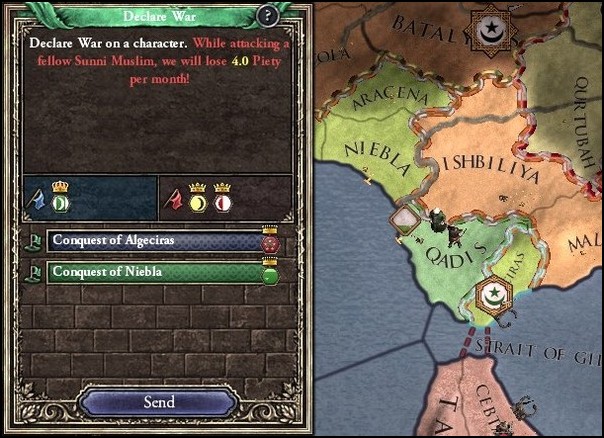
Without any choice in the matter, therefore, every man fit enough to walk and hold a sword was forced into Sheikh Azar’s new army, with the total number of troops amounting to just over 4500 men.
Once the army had mustered near Cádiz, Az’ar pushed east on a forced march into Algeciras, hoping to pin down the local Abbasid force before it could escape. Many of the Cádizians were sure that they were marching straight into death, but the first enemy force they engaged was significantly smaller, and were quickly cut down in a decisive victory. First blood to Az'ar.
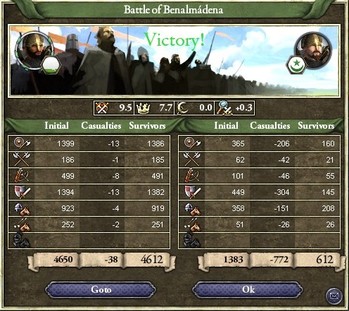
The sheikh didn’t stop to celebrate, however, immediately pushing his forces forward and engaging another Abbadid army further east, and this time he displayed his strategic brilliance by crushing the enemy flanks and completely surrounding the bulk of their army within two hours of the battle beginning. The manoeuvre was perfectly executed, and when he finally ordered that the pocket of trapped, desperate men and horse be squashed, every single Abbadid soldier on the battlefield was cut down in brutal slaughter.
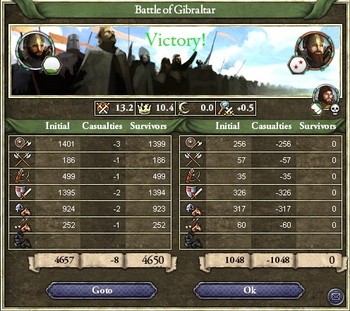
Before the victory could be celebrated, however, word reached Az’ar that the Abbadids had regrouped with their allies and launched a devastating attack on Cádiz.
Az’ar was quick to march back the way he came, and with his emotions buoyed by his two recent victories, the headstrong Sheikh decided to directly engage the superior Abbadid army straight-on.
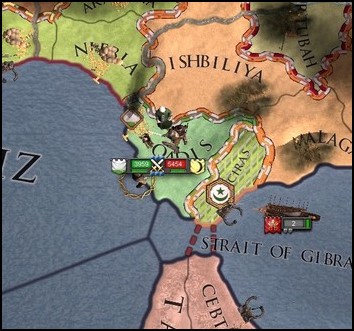
In the close battle that followed, Az’ar was able to imitate earlier successes by inflicting devastating damage to the enemy flanks, personally leading cavalry charges wherever the fighting was thickest. The Abbadid army was too large to defeat in a single engagement, however, and Sheikh Az’ar was eventually forced to make an organised retreat.
The Abbadid Emir had sustained greater losses, but he had still forced Az’ar to fall back, so both sides considered the battle to be a stalemate.
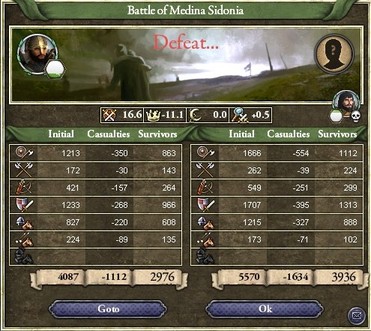
Az’ar fell back into neutral territory with his army in disarray. He was a confident and ambitious young man, but even he knew that pushing his men too far could have disastrous consequences, so he decided to avoid any further engagements for a few months, allowing his troops to recover in both numbers and morale.
Whilst resting alongside the Guadalquivir River, however, something… strange happened. Scouts reported that a large force was approaching their position, so the Sheikh commanded his generals to prepare for battle, assuming that the Abbadid Emir had decided to seek him out.
The army nearing, however, had no intention of fighting Sheikh Az’ar.

Three women emerged from the ranks of warriors and walked straight into the Cádizian camps, simply stating that they had been ‘sent’ to speak with Sheikh Az’ar, who by now had earned a reputation for his decisiveness and ruthlessness on the battlefield.
When questioned as to who sent them, however, the women refused to answer. This quickly led to an argument between the guardsmen and the three women just outside the Sheikh’s tent, which in turn escalated into a brawl, forcing Az’ar to exit and see what was causing all the commotion. One of the women, a tall blonde covered head-to-toe in strange tattoos, immediately leapt towards Az’ar, and for a moment everyone feared their Sheikh was about to be assassinated.
Instead, the woman simply grasped Azar's shoulders, and whispered his ear. After considering for a moment, the Sheikh nodded solemnly, and invited the three women into his tent. No one truly knows what they spoke of, with many even claiming that this entire scene had never transpired, but rumours allude to everything from the forging of a new alliance to the forbidden worship of Iblis - a sin beyond reckoning.
What we do know for fact is that this 1500-strong force led by women actually joined up with Sheikh Azar’s army, pledging their undying loyalty to him, in life and death. Why or how Az’ar had earned their respect, nobody knows.
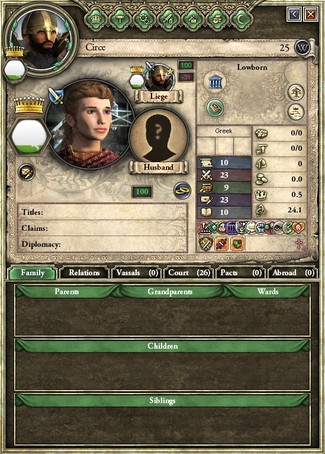
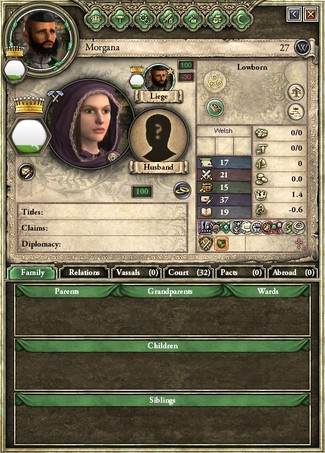
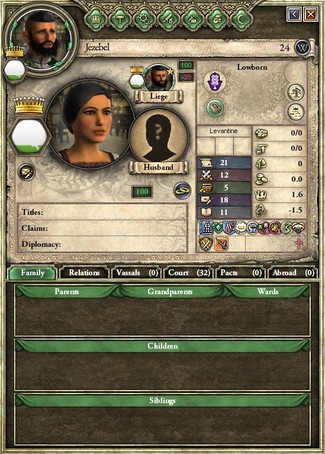
With winter coming to a close, Az’ar ended this period of rejuvenation not long after the auspicious incident, and pushed his army south to engage the Abbadid Emir once again. The enemy was found still attempting to breach the newly-built fortifications surrounding Cádiz, so Az’ar was able to pin them between his own army and the city walls, leading his forces into another stunning, decisive victory.
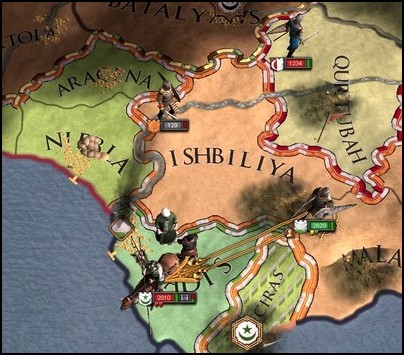
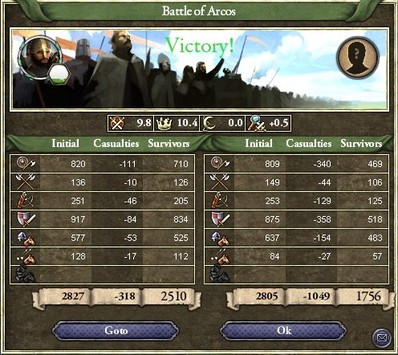
The Abbadid army was routed and forced to retreat in a scramble, making for easy pickings when Az’ar pursued them. He then turned once more and led his force back to Algeciras, this time outright assaulting the fortress and forcing its capitulation within the month.
With his army decimated and Algeciras lost, the Abbadid Emir was finally forced to the negotiation table, agreeing to cede Algeciras and send yearly tribute to Sheikh Az’ar in exchange for peace.
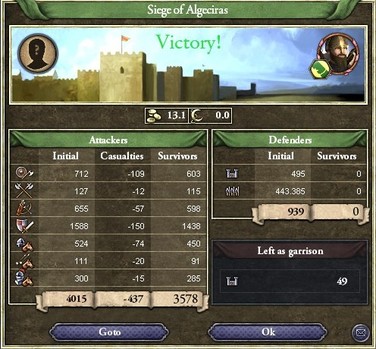

And with that, the Taifa of Cádiz has expanded for the first time since its initial conquest. Sheikh Az’ar returns to his capital to find a hero’s welcome waiting for him, with thousands of smallfolk cheering at the prestige and gold flowing into the city with their Sheikh, and the nobility politely congratulating the young Az’ar whilst fuming under their masks.
Unbeknownst to everyone, however, everything is about to change in Cádiz. For Az’ar has brought the three women with him, beginning an era shrouded in mystery, rumour and speculation in history and legend alike.
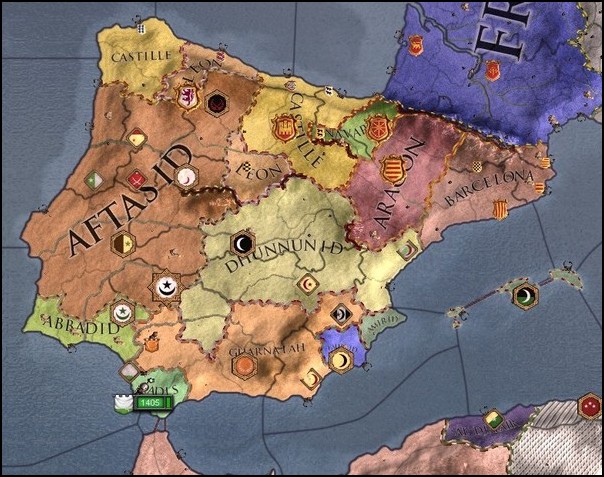
A few interesting tidbits that didn’t make the chapter:
- Marshal Salah was having an affair with Azar’s mother for a long while, until he got blinded in a botched treatment, and she seemed to leave him.
- After defeating the Holy Roman Emperor in a war for Holland, King Philip of France tried to reconquer Normandy from the Norwegians, but failed to do so and thus lost all his claims to the region.
- As it turns out, being demon spawn does wonders for your piety:
